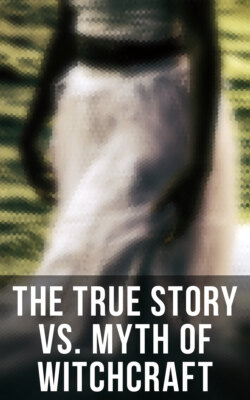Читать книгу The True Story vs. Myth of Witchcraft - William Godwin - Страница 125
На сайте Литреса книга снята с продажи.
Simon Magus.
ОглавлениеBut the most remarkable passage in the New Testament on the subject of sorcery, is one which describes the proceedings of Simon Magus, as follows.
“Then Philip went down to the city of Samaria, and preached Christ unto them. But there was a certain man, called Simon, which before time in the same city used sorcery, and bewitched the people of Samaria, giving out that himself was some great one. To whom they all gave heed, from the least to the greatest, saying, This man is the great power of God. And to him they had regard, because that of long time he had bewitched them with sorceries. But, when they believed Philip, preaching the things concerning the kingdom of God and the name of Jesus Christ, they were baptized both men and women. Then Simon himself believed also. And, when he was baptized, he continued with Philip, and wondered, beholding the miracles and signs which were done.
“Now, when the apostles which were at Jerusalem heard that Samaria had received the word of God, they sent unto them Peter and John. Who, when they were come down, prayed for them, that they might receive the Holy Ghost. For as yet he was fallen upon none of them: only they were baptized in the name of the Lord Jesus. Then laid they their hands on them, and they received the Holy Ghost.
“And, when Simon saw that, through the laying on of the apostles’ hands, the Holy Ghost was given, he offered them money, saying, Give me also this power, that on whomsoever I lay hands he may receive the Holy Ghost. But Peter said unto him, Thy money perish with thee! because thou hast thought that the gift of God might be purchased with money. Thou hast neither part nor lot in this matter: for thy heart is not right in the sight of God. Repent therefore of this thy wickedness, and pray God, if perhaps the thought of thy heart may be forgiven thee: for I perceive that thou art in the gall of bitterness, and in the bond of iniquity. Then answered Simon, and said, Pray ye to the Lord for me, that none of these things which ye have spoken come upon me.” 119
This passage of the New Testament leaves us in considerable uncertainty as to the nature of the sorceries, by which “of a long time Simon had bewitched the people of Samaria.” But the fathers of the church, Clemens Romanus and Anastasius Sinaita, have presented us with a detail of the wonders he actually performed. When and to whom he pleased he made himself invisible; he created a man out of air; he passed through rocks and mountains without encountering an obstacle; he threw himself from a precipice uninjured; he flew along in the air; he flung himself in the fire without being burned. Bolts and chains were impotent to detain him. He animated statues, so that they appeared to every beholder to be men and women; he made all the furniture of the house and the table to change places as required, without a visible mover; he metamorphosed his countenance and visage into that of another person; he could make himself into a sheep, or a goat, or a serpent; he walked through the streets attended with a multitude of strange figures, which he affirmed to be the souls of the departed; he made trees and branches of trees suddenly to spring up where he pleased; he set up and deposed kings at will; he caused a sickle to go into a field of corn, which unassisted would mow twice as fast as the most industrious reaper. 120
Thus endowed, it is difficult to imagine what he thought he would have gained by purchasing from the apostles their gift of working miracles. But Clemens Romanus informs us that he complained that, in his sorceries, he was obliged to employ tedious ceremonies and incantations; whereas the apostles appeared to effect their wonders without difficulty and effort, by barely speaking a word. 121
